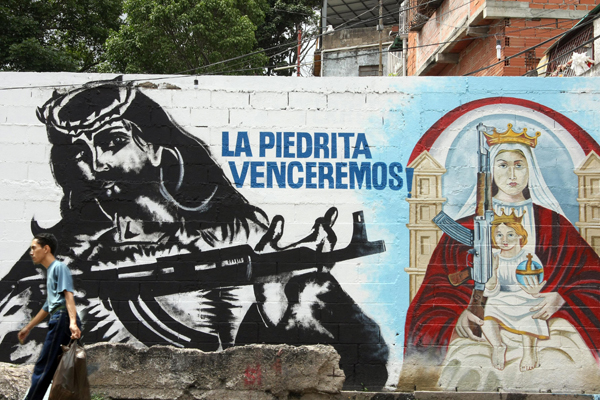Venezuela’s vice president has threatened to repress opposition protests with colectivos — pro-government armed groups that are becoming increasingly criminalized — bringing the country closer to the brink of civil conflict, and the state closer to criminality.
Vice President Aristóbulo Istúriz warned on October 27 that the government would call on colectivos to take to the streets on November 3, the day the opposition plans to stage mass protests and march to the Palacio de Miraflores presidential palace, according to Infobae.
Colectivos are barrio-based, pro-government groups, armed by former Venezuela President Hugo Chávez to defend his Bolivarian Revolution.
“We’re going to surround Miraflores, fill up the Bolívar avenue, fill up the Universidad avenue, fill up the Lecuna avenue and [the protestors] will be met with the iron knights,” Istúriz stated before adding, “They say they’re going to march on Miraflores. That they’re going to bring Maduro his farewell letter. Well we’re going to block Bolívar avenue.”
The vice president’s threat of calling upon the “iron knights” — a term refering to biker-gang colectivos also called “bandas motorizadas” — comes a day after the opposition staged nationwide protests in Venezuela to contest the blockage by electoral authorities of the recall referendum process against President Nicolás Maduro. The announcement also preceded the general strike of October 28 which the opposition called for.
Diosdado Cabello, former head of the National Assembly, warned that “the bourgeoisie’s defeat is coming, the nation will march to Miraflores on the 3rd [of November] and will tell the world: Venezuela is to be respected, Venezuela is free, Venezuela is sovereign.”
InSight Crime Analysis
The vice president’s threat to resort to radicalized armed groups is the latest, worrying example of the government’s increasingly hostile approach to the political opposition and evidence of mounting criminality within the regime.
Research by InSight Crime has shown that many of the country’s colectivos are becoming criminalized and violent, extorting the communities they often claim to protect. The deployment of colectivos to confront potential protestors is particularly worrying and points to the fusion of ideology with criminality — these armed pro-government groups have long been associated with violence. They have been involved in territorial street battles with state forces such as the National Guard and their relationships with government forces vary and change. They have also formed part of controversial operations (Operación de Liberación y Protección del Pueblo – OLP) carried out with other state forces.
The term colectivo can refer to a variety of political groups that adhere to left-wing socialist ideologies. Some of the more traditional ones pre-date the Chávez regime, focus entirely on cultural or social activities in defined areas and are harmless. But others constitute armed, unregulated militias responding to government orders.
Chávez focused on arming the colectivos following the coup in 2002 by dissenting high-ranking members of the military that temporarily removed him from power. After that, Chavez wanted to create an armed guard answerable only to him. Research by InSight Crime suggests that the colectivos vary in form and structure; “colectivos territoriales armados” operate and control specific areas, whereas “bandas motorizades” are less structured and territorial but operate with impunity and with the government’s full support. For some newer, emerging colectivos, the socialist ideology is little more than a façade used to cloak criminal activities, in particular extortion.
There is also growing evidence of criminality at high levels of the Maduro government, most recently the US indictment of Néstor Reverol, now Venezuela’s Minister of Interior and Justice, on drug trafficking charges. More than two dozen other current or former government and military officials are being investigated on corruption or trafficking charges, some of which are thought to be members of the Cartel de los Soles, a loose network of Venezuelan military officials involved in cocaine trafficking. The nephews of President Maduro’s wife and first lady Cilia Flores are currently in custody for their alleged involvement in an international cocaine trafficking deal.
SEE ALSO: Coverage of Money Laundering
Three of Chavez’ most prominent policies were the government appropriation of Venezuela’s rich oil reserves to finance social programs and fight poverty, the implementation of a government-controlled pricing system for certain basic products, and currency exchange rate controls. All three have fueled the rise of corruption within government institutions and the expansion of black markets.
The state-owned oil company Petroleum of Venezuela, S.A. has allegedly lost over $10 billion to corruption and several of its high-ranking executives have pleaded guilty in the United States for having accepted bribes. The currency control system creates incentives for fraud, the worth of which could reach $69.5 billion according to the New York Times. And the price control of basic products, especially food and gasoline, has fed contraband dynamics on the border with neighboring Colombia.
But the colossal losses incurred by corruption fueled by plummeting oil prices have led to an economic crisis and widespread food shortages. Those factors have also contributed to the current political turmoil, and the opposition has launched a process to revoke Maduro’s presidency by way of referendum. It is the blockage of this process by Venezuela’s Supreme Court that sparked the latest protests. If the opposition wins in such a referendum before January 10, new elections will be called. But after that date, the current vice president would take over for the rest of the presidential term.
Given that the economic crisis shows no sign of abating, the political, social and criminal tensions threatening Venezuela’s stability will only intensify as the end of the year nears.

